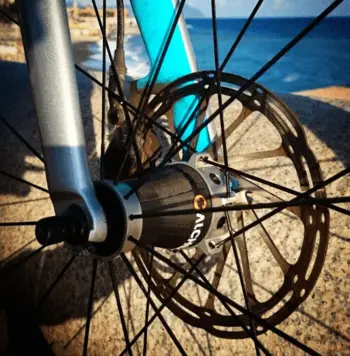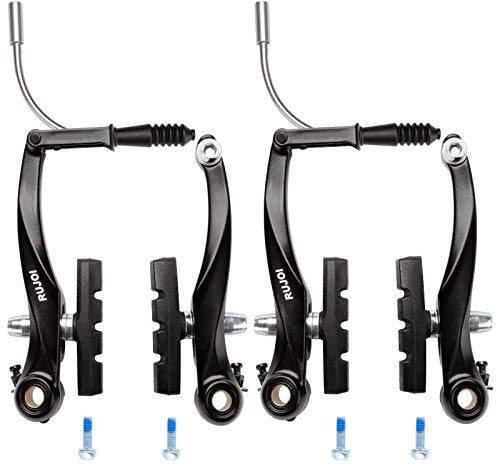
Recently, we see that many bicycle companies now have mostly bicycle models with disc brakes. In fact, a lot of money is being invested in marketing focused on selling discs for every type of cycling. It is therefore easy to understand why most people think that disc brakes are better for road bikes. At least most of the newer members of the cycling community. Most old-school cyclers still firmly believe in rim brakes, and there are justified reasons for that which I will try to explain later.
Are Disc Brakes On Road Bikes Worth It?
Disc brakes have become popular on all types of bicycles for various reasons. One and certainly the biggest of these is that they are considered to offer superior braking. That seems to make sense – after all, disc brakes have revolutionized the performance of brakes on cars and motorcycles. So the question is why not do it on bikes?
Just think of mountain bikes, nowadays almost no one wants an MTB bike with rim brakes. On the other hand, road bikes have a great tradition behind them and it is very difficult to change road cyclers thinking about the look and the new design. And of course, in road cycling, everything is about weight.
In particular, I don’t mind the disc brakes, I like them. But at the moment I have a really nice bike purchase on my mind and I really like it, but it comes with rim brakes. The first question is: If it’s still justified to buy a bicycle with rim brakes for someone who is not into competitive road cycling? And the other question would be: If I buy a bicycle with rim brakes now and the future brings discs, will it be difficult for me to sell that bike later? Will they become worthless, just as they become 26 ‘wheels with the appearance of those larger than 27.5’ and 29 ‘wheels?
Let’s get into the actual pros and cons that we can confirm at this time.
- ✅Bike V-Brake Kit : The Package Contaion V-Brake Kit with 4 Pcs V brake pad ,2 sets of bolt screws.
- ✅Strong Brake Arm Size : 110mm long Aluminum Alloy, Durable and Reliable.Fit with most V-Bike Bicycle Installation
- ✅Brake Arm tension adjustable : Easy adjust tension of Brke Arch in Spring inside by putting in the correct position of Frame/Fork
- ✅Excellent V-Brake Brake pads : The 55mm Rubber Pads comply with EN14766, significantly reduce stopping distance smoothly ,no noise
- ✅Perfect Bicycle Brake replacement : The brakes set fit for most V brakes Type bike brake parts upgr
Prices pulled from the Amazon Product Advertising API on:
Product prices and availability are accurate as of the date/time indicated and are subject to change. Any price and availability information displayed on [relevant Amazon Site(s), as applicable] at the time of purchase will apply to the purchase of this product.
Stopping Power of Disc Brakes
It is an indisputable fact that disc brakes offer greater stopping power than rim brakes. I had ridden a friend’s road bike with disc brakes before and was surprised by the confidence offered by the discs. But the question is how much do we need that higher stopping power on a road bike? How often do we need strong braking on a road bike? I really, with the exception of the descents, rarely use the brakes on a road bike, and many of you believe it.
If we are going to talk about stopping, I recently had a major accident with a road bike that was equipped with rim brakes. This is what actually got me into researching and writing about this topic. I hit the brakes too fast, I squeezed the brakes hard, and they really offered strong stopping power, even the rear wheel locked, but the narrow tires of the road bike couldn’t transfer that power to the road causing it to slip and fall. I believe the same thing would happen with disc brakes.
My conclusion is that stopping power is there with rim brakes it just requires a bit of power from a rider. The problem is the linear increase of that power. With disc brakes, you can adjust stopping power more easily by squeezing the brake levers exactly how much you want. On rim brakes, however, you are stuck with weak stopping power most of the way and then suddenly stop the wheel when you reach a certain point with a brake lever.
Braking in Wet Weather: Disc vs. Rim Brakes
Another benefit to disc brakes. They do provide consistent braking in all weather conditions. Not completely consistent but greatly increased in braking consistency, I would say. This is especially pronounced with carbon wheels.
But on the other hand, the question is, how often are we driving in rainy conditions? I see the point here in more professional road biking, where teams have to ride regardless of the weather. However, for us recreational road cyclists, this is of less importance.
- Material: Toray T700c Full Carbon Fiber
- est:Pass EN quality standard test
- Weight:1565g±30g/pair excluding skewers
- Warranty:1years under normal us
Prices pulled from the Amazon Product Advertising API on:
Product prices and availability are accurate as of the date/time indicated and are subject to change. Any price and availability information displayed on [relevant Amazon Site(s), as applicable] at the time of purchase will apply to the purchase of this product.
Maintenance: Disc vs. Rim Brakes
Here goes the big plus for rim brakes, which are easier to maintain than hydraulic discs.
When we say maintenance what do we mean? I personally, think of everything you could possibly need to do about them. Disc brakes are harder to adjust, install, bleed, clean and pretty much everything except replacing the disc brakes pads. Replacing disc brake pads is quite simple, if not simpler, than the rim brake pads.
How often do we actually need to bleed the brakes? I ride an MTB bike with Shimano XT brakes and never once in 3 years did I have the need for bleeding, and even if the need arises, you can simply take the bike to a repair shop where the guys do the job within minutes.
When it comes to cleaning and adjusting, it becomes a bit more complicated than that. Cleaning disc brakes is not that hard, but it requires recognition on time. Even though it’s rarely needed, you need to know when to do it so the brake pads don’t get ruined.
Adjusting disc brakes is where it gets a bit annoying. Road cycling is all about pedaling efficiency and rotors touching the brake pads isn’t really helping that. From what I tested, rotors that are only a bit bent can decrease your speed and efficiency quite a lot. And maintenance, in that case, can become a nightmare.
Rim brakes, on the other hand, almost never require cleaning, are really easy to adjust and require it only from time to time. There is no bleeding with them since there is no oil, and installing or changing cables is a straight forward process with very little complication.
Weight: Disc vs Rim Brakes
Because of the accessories that are required for disc brakes, they come as heavier than the rim ones, so here goes the plus for rim brakes. The rim brakes are usually made of lightweight aluminum material, so they are significantly lighter. We can have divided opinions here as well. I am not so much oriented for lightweight but it is really nice to see a figure less than 7kg when weighing a bike.
This should not concern anyone other than professionals or someone in heavy training. Mainly because that little added weight won’t make any difference in your recreative riding results. When you combine the weight of your bike and you as a rider, the difference drops under 1%.
Heat Loss And Wear: Disc vs Rim Brakes
Here again, we have the advantage of disc brakes. What do I mean?
During long descents, brake brakes can heat the rim of the wheels, resulting in weakening or loss of braking power – this is especially pronounced with carbon wheels. Disc brakes remain much cooler and their stopping power will not weaken as much. Also, there is a problem with wheel wear with the rim brakes, so sometimes we have a problem with the need to replace the wheel rim or the whole wheel. This can get really costly while changing rotors on disc brakes is way cheaper.
This is one problem that I think favors disc brakes, especially for someone who isn’t a professional or experienced cyclist. Rim brakes require a bit of knowledge and experience of predicting when you might lose braking power.
Injury With Disc Brakes
The advantage here is that of rim brakes, where there is almost no likelihood of a direct injury. Concerning the injuries on the disc brakes, I did not specifically testify to any, but I did follow up on the media reporting this as well as the injuries sustained by Fran Ventosa of the Movistar driver at the Paris – Roubaix race. It happened in 2016 and I have not followed up with any major reports of disc brake injuries since.
I don’t really think too much about injuries when I go for a ride. We are much more likely to be hit by a car than to be injured by a disc brake, but as I said, I don’t want to think about it when I drive off.
On the other hand, rim brakes can cause injuries by less braking power if you are not an experienced road cyclist. All in all, I would say that this category is a draw between the two.
My Conclusion
I don’t know if I skipped something, but looking at the advantages and disadvantages of the above items, when we exclude the aesthetics, the result is even.
In terms of performance, disc brakes are better without further ado. They offer better stopping power than the rim brakes will ever be able to offer. However, if you are one of those cyclists counting every gram, then rim brakes are a better option. The latest technologies, with rubber on brake pads and wheel rims, offer truly stunning performance and excellent stopping power without adding to the weight.
My conclusion is that disc brakes are better for someone less experienced or recreational cyclist while rim brakes are better for professional riding and chasing stats.
What I’m interested in as well as how the market and trends on the market will develop going forward. I like to sell my bikes often and change to new things, so I would love to be able to do that in the coming years.


